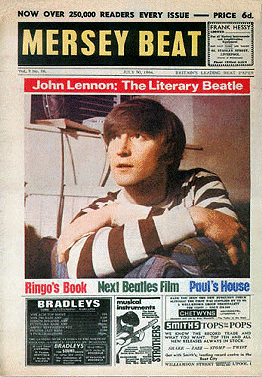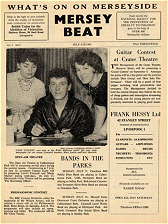 |
 |
|
Mersey
Beat - Merseyside's Own Entertainment Paper - The Beatles, The Liverpool
Sound, The Swinging Sixties... It's still happening, man!
|
Money, of course, was tight - the office cost £5 a week, Virginia had a salary of £2.10s and I took no wages at all, but lived on my grant from a Senior City Art Scholarship. The first person that I approached to write for me was John. I’d originally discovered his ability as a wordsmith when we were sitting together in 'Ye Cracke' one evening. I’d heard rumours that he wrote poetry and asked if I could see a sample. He was, initially, reluctant to discuss it then gave way and showed me a poem he had on folded scraps of paper in his pocket. I found that it was full of humour, double entendres and was so essentially 'British'. No San Franciscan poet could have written this . . . . .
|
Owl George 'ee be a farmer’s
lad With mucklekak and cow 'Ee be the son of ‘is owl dad But why I don’t know how .'Ee tak a fork and bale the hay And stacking-stook he stock And lived his loif from day to day Dressed in a sweaty smock. One day he marry be To Nellie Nack the Lass And we shall see what we shall see A-f***ing in the grass. Our Nellie be a gal so fine All dimpled wart and blue. She herds the pigs, the rotten swine, It mak we wanna spew! Somehaps, perchance, 'ee’ll be a man But now I will unfurl Owl George is out of the frying pan ‘Cos ee’s a little girl. John Lennon |
 |
I
was later to ask John if he could write me a piece for my forthcoming
publication about his group. In the meantime, Virginia and I were
preparing the debut issue. Generally, after I’d taken Virginia home
in the evening, I’d return to the office and work through the night
- often going out for a break at four in the morning to the Pier Head
where I’d get a cup of tea and a hot pie. The time came for me to think of a name for the publication and I was racking my brains – it was to be a ‘what’s on of Merseyside music’ but what should I call it? It was around 2 o'clock one morning when I sat back and began to work out what the name should be. One decision I had to make was regarding the area I’d be covering. I thought that, apart from Liverpool, I’d cover ‘over the water’ – The Wirral, Birkenhead, New Brighton, because there was a lot of activity there with groups. I also decided to include Crosby and Southport because there were also venues there for the groups. Warrington, Widnes and Runcorn would also be part of my 'beat'. I began to visualise in my head a map of the area I’d be covering. I pictured the entire Merseyside conurbation and, suddenly, in the visualisation, I saw a policeman – a policeman’s beat! The entire area of Merseyside would be my 'beat' – the 'Mersey Beat'! |
At that time there was no such term as ‘beat group’ - that only came later, after 'Mersey Beat' had been established as a paper. The groups were rock ‘n’ roll groups and the venues were jive hives – jive and twist were the most popular terms, then, to describe the music. I arranged for James E. James to print the newspaper but, due to costs of having metal blocks made, I couldn’t use many photos in the first issue. 'The Widnes Weekly News' lent me a block they’d had made of Gene Vincent with Terry Sharrock and Mary Larkin, the two girls who worked at The Jacaranda, and I used that as the front cover photo. To illustrate adverts I used blocks of cartoons from my art school mates which I’d originally used in 'Pantosphinx'.
The article on page 4, ‘Swinging Cilla’, was responsible for Cilla Black’s stage name as the second paragraph begins with the words ‘Cilla Black is a Liverpool girl who is starting on the road to fame'. I remember going down to the State Ballroom one evening when I was putting the first issue together and asking Cilla if she had the fashion column that she had promised me. She was with her mate, Pat Davies, and 'Cass & The Cassanovas' were on stage. When I got back to the office I began working on the copy for the first issue and began to type out a story on Cilla. When it came to putting down her surname my mind went blank - I knew it was a colour, but forgot which one. I took out the piece of paper with Cilla’s fashion column on it (which was published in Issue No. 2) but she hadn’t signed it. The column was all about colours in fashion and went from white to black. Looking at it I decided on the 'black' but I was wrong - her name was Cilla White! After Mersey Beat was published, Cilla came into the office and told me that I’d got her surname wrong – but she liked it so much she decided to call herself Cilla Black from then on!
| When
we were sitting in 'The Jacaranda' shortly before The Beatles set
off on their second trip to Hamburg, John handed me some scraps of
paper – it was the piece I’d asked him to write about The Beatles'
origins. It was something totally unexpected and its sheer wackiness
delighted me. I immediately ordered him coffee and jam toast! The piece appeared on page 2 of the first issue (right), which was originally published on July 6th 1961. The humour of it appealed to me. It was the time of 'The Goons' (who regularly said 'you rotten swine') and at Junior Art School I'd been involved with some friends in what we called the 'Natty Nut Society'. I was also interested in the nonsense novels of Stephen Leacock (as was Paul McCartney). As a result I decided to print the biography, as John had written it, without altering a single word. It had no title so I made up the heading 'Being A Short Diversion On The Dubious Origins Of Beatles (Translated From The John Lennon)'. It’s interesting to note that a sentence from the piece: “It came in a vision – a man appeared on a flaming pie and said unto them ‘From this day on you are Beatles with an A’ provided the inspiration for Paul’s ‘Flaming Pie’ album decades later. I ordered 5,000 copies of the newspaper and approached the three main wholesale distributors on Merseyside – W.H.Smith, Conlan’s and Blackburn’s, and they all agreed to take copies. I also trekked around Liverpool and got personal orders from 28 newsagents. Then I arranged with Ray McFall to stock it in the 'Cavern' and I also contacted Brian Kelly and other promoters to take copies. |
 |